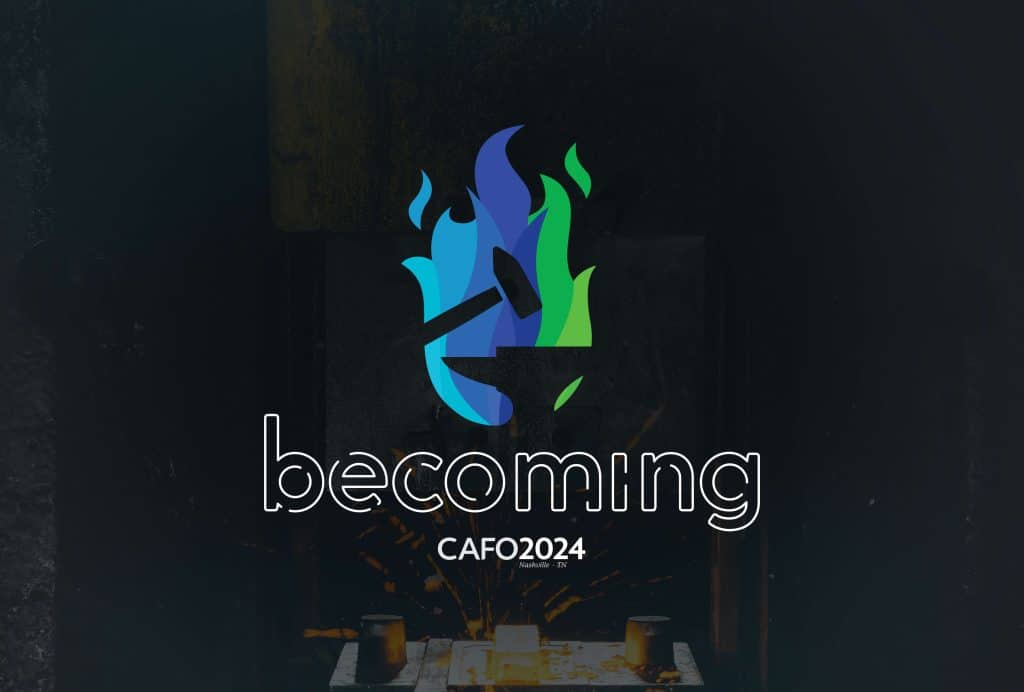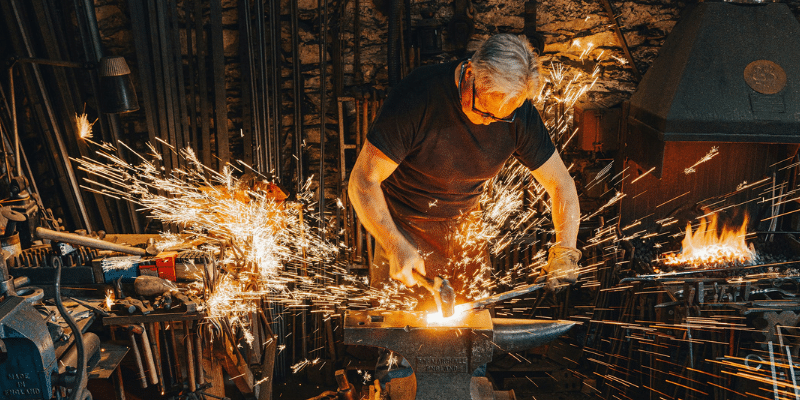Can you see the blacksmith’s shop? Fire, steel and sweat … hammer and anvil … clang and concussion. The Blacksmith knows what it’s all for. He labors for a future good no one else yet sees: to meld usefulness and beauty, blending perfect form and function in a single object. That is the end to which He works.
He will apply every tool at His disposal to bring it about: tongs and bellows, searing flame and cooling bath. He is the Master. But the steel plays its part, too – defiant or pliant – resisting or participating with the Greater Power to become the good that He intends.
This is the great end to which He works. Usefulness and beauty, united in one form.
God’s highest good for you
Let us now consider this thesis: God’s great interest in your life is not in what you can accomplish for Him. Nor is His highest good your comfort or success or health or good name. Those can be marvelous things, and He often delights to give such gifts to His children when they will not stand in the way of better.
But God’s great interest in your life runs much deeper. It is no less than this: the person you are becoming. God’s highest good for you is that you would “be conformed to the likeness of His son” (Romans 8:29), that “Christ be formed in you.” (Galatians 4:19)
It is that the calm, the joy, the patience, the strength and tenderness that filled Jesus would also fill you. It’s that you would know the light yoke of self-forgetfulness. That your food would be the pleasure of doing your Father’s will. That all that you think and say and do will bring glory to Him and good gifts to others. It is that goodness itself would spill out of you – not by strained effort, but because of who you are becoming.
That is God’s great interest in your life, His highest good for you. Everything else – everything – is a distant second.
What this changes in us
When we begin to live into a vision like this, a remarkable shift occurs.
Winds still blow. Life and people still make their demands upon us. Our work still must be done – tasks addressed, care provided, burdens borne.
Yet how we see all these things morphs. And because we see differently, how we prioritize and act changes as well.
How we perceive hardship changes.
Yes, we still want to avoid suffering. But we begin to sense in every trial the fires of a forge. We recognize their power to refine and refashion. Shockingly, we can even “consider it pure joy when facing trials of many kinds” (James 1:2), confident that God can use them to form us into a different sort of person – one who looks much more like Jesus. We don’t want pain or sorrow; but we want so badly to become that sort of person that we will embrace even this if He’ll use it for that marvelous end.
How we view the Christian life changes.
Yes, we still study and serve and pray and give. But our aim in all this is not merely to do the right things, but to grow into the kind of person who does these things naturally. Our goal is not just to act kindly or patiently or joyfully, but for our inner being to become kind and patient and joyful – such that these actions flow from us as readily as water from a spring. (John 7:38)
What we want for our kids changes.
Yes, we still want them to be happy – to get good grades, do well in sports or music and be liked by their friends. But most of all we hope and pray and nurture for one end: that they will grow more like Jesus. So we set our compass in parenting not with questions like, “How will this look on a college application?” or even “Will this make them happy?” but “What will most help them become more like Jesus?”
How we lead changes.
Yes, we still seek great results with great effort and intentionality – whether profits or test scores or service outcomes. But we are every bit as intentional about caring for the people we lead and nurturing their growth as we are about our external mission. We do this first as an expression of love. But we know it’s also good for results, too. As Jesus put it, a good tree will produce good fruit. (Matthew 7:17)
Little by little, these changes seep into everything else as well.
Fundraising moves from, “What can we get from donors?” to, “What do I want for donors – and, most of all, how can we help them know, love and reflect Jesus more deeply?”
Prayers shift from, “Please change this situation!” to “Please change this situation … but most of all please use it to grow my heart closer to Yours!”
Our thoughts about movies or music or Internet habits migrate from, “Is this permissible?” to, “Will soaking my mind in this grow me to be more like Jesus or less?”
We still love our family and friends … purposeful work and relaxing vacations … the Kansas City Chiefs … chips and guacamole (especially that). But what we long for most of all is to grow more like Jesus every day, and to help others to do the same.
What does living this way feel like?
What does it feel like to live this way – to believe and live as if God’s great work in your life is not about your achievement or reputation or anything else – but the person you are becoming in Him?
In a word, it feels light.
I remember talking years ago with my Dad about how my brothers and I worked with him when we were boys. Even before I can remember, we spent countless afternoons and Saturdays out in the almond orchard together, pruning and fertilizing and harvesting.
I always thought he needed our help. But he pointed out as we talked – starting with a grin and gentle, “Well, you know, Jedder…” – that when we first started working with him, we weren’t much use. We were small and weak. We’d do many things wrong and get in the way. Worst of all, after an hour or two, we’d often start whining like wet puppies about the cold or heat or nuts falling on our heads.
“Truth is,” Dad said, “in those early years, it would have been easier to do it by myself.”
But then he said this. “But I had you out there for a good reason. I wanted to be with you. And I wanted you to learn to work like men.”
I think that’s a little glimpse of what God wants, too. He wants to be with us – and He wants to form us into a certain kind of person – people whose hearts and character and actions look like His Son.
As that happens, we do become useful. My brothers and I eventually did, too. God has good work for us to do, and there are few things better than getting to join Him in it. But His first priority, His great interest, is in the person you are becoming. Everything else follows from that.
Whatever it is you’re doing – running a business, helping a neighbor, teaching a child, lying alone in a hospital bed – He wants to be with you and to form your heart into the image of Jesus. That’s what matters more than anything else.
Knowing that feels wonderfully light. It lifts the load that comes with imagining that what matters most is what we can achieve. It frees us from the need for relentless activity. It breaks the shackles of worry about what others think of us. It liberates us from the dread weight of imagining we need to “change the world.”
And yet, marvelously, God invites us to join in the work – both His work in the world and His work in us. It is “God who works in you to will and to act according to His good purpose” and yet He calls us to “work out your salvation with fear and trembling.” (Philippians 2:12-13). In Scripture, these seemingly opposite truths always live side by side.
He is the Blacksmith, the vastly greater power. But we participate as we align our will with His will, pair our little strength with His great strength, and match our small, daily choices with His eternal invitation.
Introducing the theme of CAFO2024
And so we come to the theme of CAFO2024, the 20th Summit to date. It is a single word: BECOMING.

Together, we will explore ideas and images, scriptures and songs, presentations and prayer, companionship and conversations about what it looks like to seek this prize above any other.
- We’ll ask what effective leadership looks like guided by this north star;
- We’ll inquire as to the small choices and age-old Christian practices that cultivate the character of Christ in us;
- We’ll explore how to weave this into our homes and parenting;
- We’ll examine how church ministry and fundraising and mentoring and marketing and myriad other expressions of ministry are changed and multiplied as we set this priority first – both for ourselves and for all we serve.
Not what we can achieve or accomplish. Not comfort or success or health or reputation. But simply this: that we would become more like Jesus every day. This is the great end to which God works. Usefulness and beauty, united in one form.
He is the Blacksmith. He will apply every tool at His disposal to bring about that future good in us that He already can see.
And He invites us to play our part too: defiant or pliant … resisting or participating with Him to become the good that He intends.
Jedd Medefind is the President of the Christian Alliance for Orphans.
Registration for CAFO2024 Summit in Nashville, Tenn. is now open! Early bird pricing available now through March 31. Register for CAFO2024 here.

